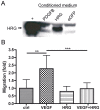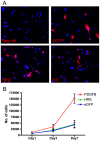Histidine-rich glycoprotein can prevent development of mouse experimental glioblastoma
- PMID: 20046875
- PMCID: PMC2795204
- DOI: 10.1371/journal.pone.0008536
Histidine-rich glycoprotein can prevent development of mouse experimental glioblastoma
Abstract
Extensive angiogenesis, formation of new capillaries from pre-existing blood vessels, is an important feature of malignant glioma. Several antiangiogenic drugs targeting vascular endothelial growth factor (VEGF) or its receptors are currently in clinical trials as therapy for high-grade glioma and bevacizumab was recently approved by the FDA for treatment of recurrent glioblastoma. However, the modest efficacy of these drugs and emerging problems with anti-VEGF treatment resistance welcome the development of alternative antiangiogenic therapies. One potential candidate is histidine-rich glycoprotein (HRG), a plasma protein with antiangiogenic properties that can inhibit endothelial cell adhesion and migration. We have used the RCAS/TV-A mouse model for gliomas to investigate the effect of HRG on brain tumor development. Tumors were induced with platelet-derived growth factor-B (PDGF-B), in the presence or absence of HRG. We found that HRG had little effect on tumor incidence but could significantly inhibit the development of malignant glioma and completely prevent the occurrence of grade IV tumors (glioblastoma).
Conflict of interest statement
Figures





References
-
- Stupp R, Mason WP, van den Bent MJ, Weller M, Fisher B, et al. Radiotherapy plus concomitant and adjuvant temozolomide for glioblastoma. N Engl J Med. 2005;352:987–996. - PubMed
-
- Plate KH, Breier G, Weich HA, Risau W. Vascular endothelial growth factor is a potential tumour angiogenesis factor in human gliomas in vivo. Nature. 1992;359:845–848. - PubMed
-
- Plate KH, Breier G, Weich HA, Mennel HD, Risau W. Vascular endothelial growth factor and glioma angiogenesis: coordinate induction of VEGF receptors, distribution of VEGF protein and possible in vivo regulatory mechanisms. Int J Cancer. 1994;59:520–529. - PubMed
Publication types
MeSH terms
Substances
LinkOut - more resources
Full Text Sources
Molecular Biology Databases
Miscellaneous

